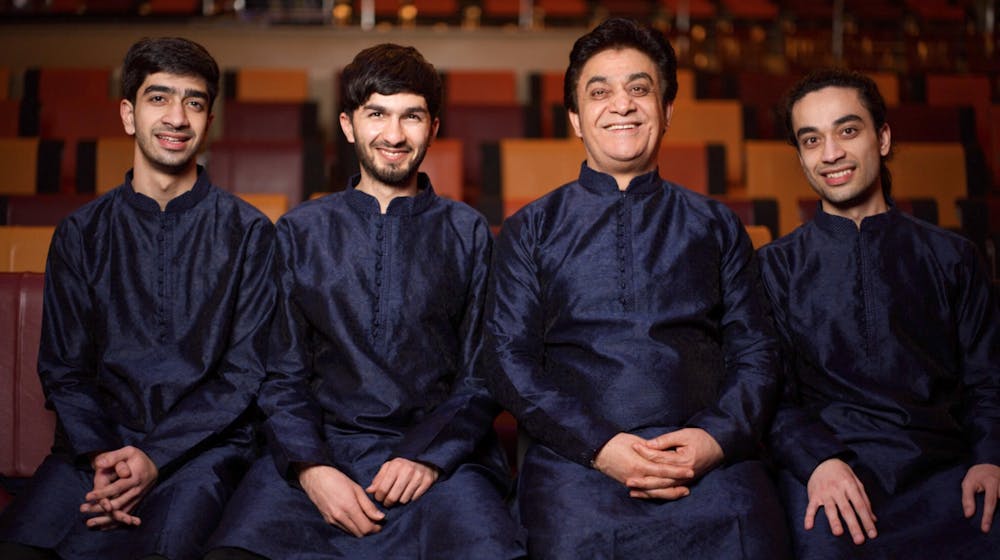Heart of Afghanistan graced Mahaney Arts Center on Jan. 13 with a performance, just under a year after their spring 2022 debut and days after their largest performance yet at the Kennedy Center. The group is made up of four performers: Afghan soap opera star and famous singer Ahmad Fanoos on vocals & harmonium, his sons Elham Fanoos and Mehran Fanoos on piano and violin and Hamid Akbar on tabla. The group performs songs that communicate Afghan history in both Pashto and Dari (Afghanistan’s two most common languages), ranging from Afghan folk songs to ballads inspired by the Afghan poet Rumi to modern love songs.
After the Soviet-Afghan War ended in 1989, many of the Mujahideen, the Afghan rebel fighters funded by the CIA, didn’t have homes to return to in Afghanistan and studied as refugees in Pakistani madrassas. Upon their return to Afghanistan, they ruled the country in a state of lawlessness that evolved into the first Taliban rule of the country, which lasted from 1996 to 2001. During that first period of control, the Taliban banned music. So when the United States retreated from Afghanistan in 2021, many artists and young people in Afghanistan anticipated another music ban, which was instituted only three months after U.S. troops left the country. Like many families, the Fanoos family fled Taliban-ruled Afghanistan in 2021. It wasn’t until this past year that they were able to reunite and form Heart of Afghanistan.
Heart of Afghanistan is presented by American Voices, an NGO that is committed to presenting cultural exchanges in nations emerging from conflict and isolation. American Voices first came into contact with Ahmad Fanoos and his sons in 2011 through a project dedicated to musical training and collaboration in Afghanistan during the war. Ten years later, after being four of the over 124,000 people airlifted out of Afghanistan by the U.S. military, Heart of Afghanistan formed as a group dedicated to sharing the music of their home country that persists beyond the last 40 years of conflict.
The performance began with a minutes-long standing ovation as the performers walked onto the stage. What seemed like a fitting reaction to the start of the show, at least with regard to the origins of the group and all that they have endured, became more meaningful when it became clear that much of the audience was from Afghanistan, and many performance-goers had traveled for hours to see the group. This information came out as the performers almost jokingly asked the audience if anyone was from a specific Afghan province before they played each song, and as more hands went up with each song, they started to interact more. The lead singer, Ahmad, who was largely silent in between songs toward the beginning of the performance, began speaking in Dari to the audience, and, as the show went on, it became more and more interactive, as it became clear how much the audience and the performers shared.
“I really appreciated the connection between the performers, especially knowing that they were family. It’s amazing when a performance comes across as valuable and exciting for the performers just as much as the audience, and I felt that in their interactions with the crowd and in seeing and feeling how moved everybody in the room was,” reflected audience-member Captain Rudolph ’23.5.
Not only were the songs that the performers played moving, but they demonstrated mastery of their individual instruments — and of the combination of their instruments. It was especially intriguing to see how the performers blended the piano and the violin with the more regionally-traditional harmonium and tabla. The harmonium operates like a floor organ, with a hand pump controlling the volume of the instrument. The tabla, also played while sitting on the floor, is a set of two drums, the Zeal and the Bam, that is tuned throughout the performance by putting pressure on the drumhead.
“The tabla was fascinating in its expression of sound. By being able to play certain pitches, the instrument pierced through the theater with satisfying fullness. Mastery over the music was apparent with every member of the ensemble,” said concert-goer and music student Alex Stimpson ’23.5.
It was a privilege to sit in the audience of Heart of Afghanistan’s performance on Friday, both because of the music played and because of the indescribable exchange that happened between performers and audience members. The performers were masterful, and their music was beautiful, but it was truly special to watch them meet their audience members and to see their performance become a dedication to the people before them. What happened in Robison Hall that night was much more than just a performance, it felt like a coming home, and for Middlebury College to be the humble host of such an event was an honor all its own.




